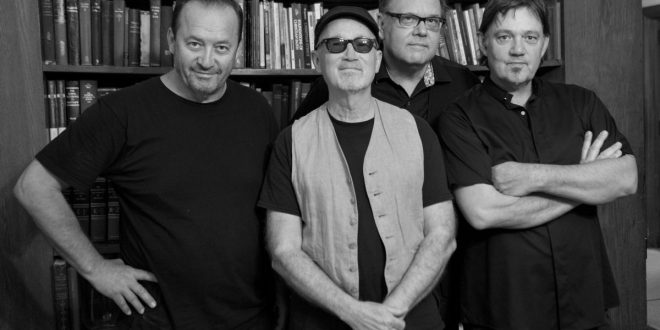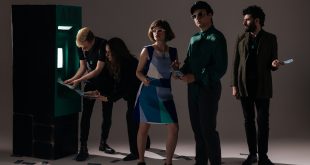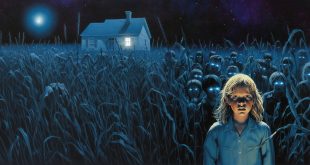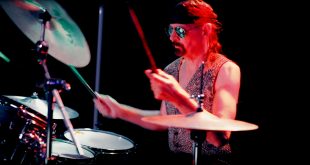New Jersey alt rock veterans The Smithereens built a solid presence on American college radio back in the mid-to-late 80s. Originally fronted by Pat DiNizio, the band’s influential blend of hard rock with British Invasion-inspired power pop was pivotal in crafting such classics as “A Girl Like You,” “Blood and Roses,” “Only a Memory,” and “Behind the Wall of Sleep.” Their success in the mainstream may have been modest at best, but they continue to leave a sincere impact on diehards and newcomers alike, especially in their nearly four-decade-strong career.
DiNizio’s passing back in December would prove difficult for members of The Smithereens to stomach. Fortunately, their tribute show held back in January, featuring a revolving run of guest vocalists, deeply reinvigorated their strength as a unit. Longtime friend, collaborator, and power pop icon Marshall Crenshaw has since joined on as front man for upcoming shows. The band’s latest release, a tribute album simply called Covers, was just put out a few weeks ago.
Prior to the band’s Evanston, Illinois show at Evanston Rocks, I caught up with drummer Dennis Diken. He was forthright in discussing how Pat’s personality still resonates within the band, and how the importance of bonds allows them to hone their craft and ultimately push forward,
ME: How have these past few shows been going?
Dennis: Thankfully, they’ve been going quite well, I must say. Obviously, it’s a whole new road for us with Pat being gone. It’s funny how he passed away in December and it’s still abstract to me, you know what I mean?
ME: Of course.
Dennis: Yeah, but the shows have been going well. Our fans made it very clear to us that they wanted to keep the music alive, and we want to keep playing. We’ve been doing this for 39 years now. We’ve done shows with Robin Wilson of Gin Blossoms; he’s passionate about our music. Those shows have been very well received, and we’re comfortable with him singing our songs.
We’re also doing shows with Marshall Crenshaw, who will be with us this weekend. Yeah, Marshall’s an old friend from the early 80s, from New York, and we share a producer – a guy named Alan Betrock. He produced early records for Marshall, as well as our EP, Beauty and Sadness, in 1983. As a matter of fact, Marshall played keyboards and some guitar on our first album, Especially for You.
ME: That’s awesome!
Dennis: Yup! He’s been in our extended family for a long time. He took part in the tribute show that we did for Pat back in January this year. It felt really comfortable and he was way into it. He has a real feeling and understanding for the songs.
ME: It’s great that this is all going so well. Back when I heard the news of Pat’s passing, it bummed me out to say the least. Since you’d mentioned how Marshall resonates with you, I want to know what you miss most about Pat, especially when it came to his showmanship as a front man?
Dennis: There’s a lot to miss, you know? He had a voice that nobody will ever have again. Pat’s persona, voice, and spirit were one of a kind. Mind you, we never had the notion of looking for someone to replace him. We wanted someone who was passionate about the music, and who fit with us stylistically as well as aesthetically, so that our sensibilities matched up. Yeah, Pat was a great showman! He really honed his craft through the years and had a tremendous sense of humor, which he’d used to great effect on stage. He really told the history of the band, and there’s so many things that only Pat can do.
In the meantime, we still have Jim Babjak – our guitar player, Mike Mesaros – our original bass player, and myself. Really, the sound of the band was forged when Jimmy and I started playing together – that goes back to 1971, when we were in junior high school. There’s a chemistry that comes together once Jimmy strikes a chord and I hit the drums. That, for me, is the essence of our sound. Of course, Mike’s one of the greatest bass players in the world, and when the three of us perform, it’s a unique sound that nobody else can create. It’s that way with any good band – the sound you create together, and the combination of what you bring to the table.
ME: Absolutely. Speaking of that, I’m a young fan of the Smithereens. One of my earliest memories of you guys was seeing the videos for “A Girl Like You” and “Blood and Roses” on VH1 Classic. I remember the sounds of both songs resonating with me a lot. What can you tell me about the importance of those songs?
Dennis: Yeah, those songs seem to really speak to a lot of people! I think they’re a great indication of Pat’s songwriting, and he was able to tap into a feel — or energy, whatever you’d call it – that resonated with humanity. All four of us, when we were playing together in those days, that was what we brought to the table, too. By being ourselves, which was a great gift. It’s probably created out of our own love of music, and what we were doing was just a natural thing.
ME: Let’s take it back a bit. When you guys first formed, how did that sound initially develop?
Dennis: We listened to AM radio in the 60s, so it was all stuff from the Beatles, Beach Boys, Motown, Creedence Clearwater Revival, The Kinks, The Who, Jan and Dean – anything and everything that was great; and there was a lot of great stuff back then. We learned to play [by ear] from listening to those records and didn’t take lessons. It was based on loving those records, listening to them, and taking from them. They all got under our skin, and really into our DNA and our blood.
ME: Obviously, there’s a lot of variety in your musical identity. What I found especially poignant was that variety translating into the tribute concert you did back in January, with a revolving cast of friends. It’s just as you mentioned – one big family.
Dennis: It is; it really is. We are family. I mean, I go back to third grade with Mike, our bass player. We’ve known each other since 1966; that’s a long time with a lot of shared experiences. We can’t help but let that come through in our music, too. And as I’d mentioned about meeting Jimmy in 1971, it was the first day of high school. With Pat, we’ve known him for close to 40 years, too. Family is a good way to put it, really.
ME: With what has happened recently, did you originally plan on putting together the tribute show for Pat?
Dennis: What happened there was that was booked as a Smithereens show, initially.
ME: Ah, really?
Dennis: Yeah. It was in conjunction with Steven Van Zandt. He was behind the show, and was making a special event to coincide with a new venue that was being launched up at Count Basie Theater in Redbank, New Jersey. So, after Pat passed, we thought that the show must go on. And we’d honor Pat by enlisting a bunch of different lead singers who we thought had respect for the music and would do a good job with it. That was quite a success, and I think we’ve received a lot more encouragement to move forward, you know?
ME: It takes great temerity, if anything. Pat’s spirit will live on through you. You never completely get over it, but at the same time, you still move forward nonetheless. That’s powerful what you guys are doing.
Dennis: Thank you! It is, in a lot of ways, and at the same time, it’s what we’d do, and what we’ve always done, you know? It would be foolish to just hang it up after 39 years. We love what we do, love being together and playing together. Yeah, it’s as you said – the spirit of Pat will live on as long as the songs are played, and at every show we’d do, anytime anybody listens to our music.
ME: I see you have a new single out – a cover of “Downbound Train,” is that right?
Dennis: Oh yeah! I almost forgot about that. We have a new album out called Covers. Through the years, when we would have extra time in the studio after recording our albums, we’d often use the time to record some covers of songs we’ve always liked. So, we thought we had quite a few of them, and we compiled them and actually released them on CD. That was put out a few weeks ago, and people are digging it; we’d gotten a lot of good reactions from it. It also kind of gives a feel for where we came from.
ME: Especially “Downbound Train,” with that working-class Jersey sound, since you’re from New Jersey, like Bruce Springsteen.
Dennis: Right! That song was actually for a Springsteen tribute record, and we were very happy with how it came out. As a matter of fact, Bruce himself had told us how much he admired that version.
ME: It’s a great rendition, and it definitely works the Smithereens way.
Dennis: Yeah it does, doesn’t it? It really does. We felt very natural doing it.
ME: Will we also see new original songs sometime soon?
Dennis: I can’t say right now, because I really don’t know (laughs). I’m wishing it up right now, but hopefully next year. I’d say it’s something we have on our plate.
ME: That’s good to hear otherwise! Lastly, anything you’d like to say to your fans?
Dennis: I’d just like to say we’re really grateful to all of our fans for sticking with us all these years. Especially during this hard time with Pat’s passing, the outpouring of support was overwhelming, but in a truly beautiful way. We’re thankful to our fans for giving us a career, because without people liking our music, we wouldn’t be out there traveling and playing for everybody. It’s a privilege and we don’t take it lightly.
Follow The Smithereens:
Official Website|Facebook|Twitter
Purchase the new Covers album here!
 Music Existence Because of Music, We Exist
Music Existence Because of Music, We Exist




